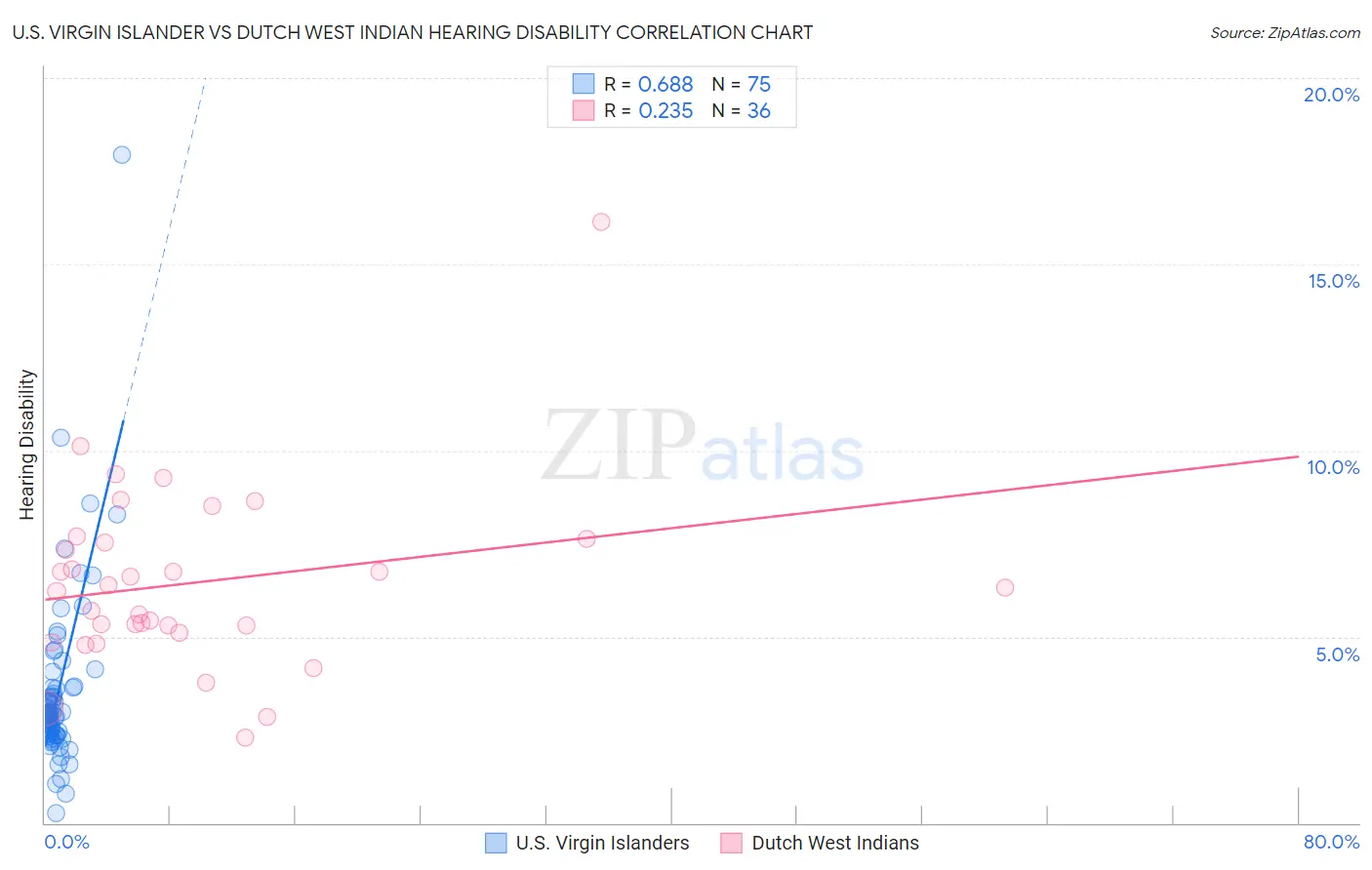U.S. Virgin Islander vs Dutch West Indian Hearing Disability
COMPARE
U.S. Virgin Islander
Dutch West Indian
Hearing Disability
Hearing Disability Comparison
U.S. Virgin Islanders
Dutch West Indians
2.8%
HEARING DISABILITY
92.5/ 100
METRIC RATING
112th/ 347
METRIC RANK
4.3%
HEARING DISABILITY
0.0/ 100
METRIC RATING
333rd/ 347
METRIC RANK
U.S. Virgin Islander vs Dutch West Indian Hearing Disability Correlation Chart
The statistical analysis conducted on geographies consisting of 87,522,963 people shows a significant positive correlation between the proportion of U.S. Virgin Islanders and percentage of population with hearing disability in the United States with a correlation coefficient (R) of 0.688 and weighted average of 2.8%. Similarly, the statistical analysis conducted on geographies consisting of 85,766,796 people shows a weak positive correlation between the proportion of Dutch West Indians and percentage of population with hearing disability in the United States with a correlation coefficient (R) of 0.235 and weighted average of 4.3%, a difference of 51.1%.

Hearing Disability Correlation Summary
| Measurement | U.S. Virgin Islander | Dutch West Indian |
| Minimum | 0.26% | 2.3% |
| Maximum | 17.9% | 16.1% |
| Range | 17.7% | 13.9% |
| Mean | 3.5% | 6.5% |
| Median | 2.9% | 6.3% |
| Interquartile 25% (IQ1) | 2.4% | 5.2% |
| Interquartile 75% (IQ3) | 3.6% | 7.6% |
| Interquartile Range (IQR) | 1.3% | 2.4% |
| Standard Deviation (Sample) | 2.4% | 2.5% |
| Standard Deviation (Population) | 2.4% | 2.4% |
Similar Demographics by Hearing Disability
Demographics Similar to U.S. Virgin Islanders by Hearing Disability
In terms of hearing disability, the demographic groups most similar to U.S. Virgin Islanders are Immigrants from Yemen (2.8%, a difference of 0.070%), Cypriot (2.8%, a difference of 0.12%), Turkish (2.8%, a difference of 0.17%), Guatemalan (2.8%, a difference of 0.24%), and Immigrants from Belarus (2.8%, a difference of 0.31%).
| Demographics | Rating | Rank | Hearing Disability |
| Moroccans | 93.9 /100 | #105 | Exceptional 2.8% |
| Hondurans | 93.4 /100 | #106 | Exceptional 2.8% |
| Immigrants | Chile | 93.4 /100 | #107 | Exceptional 2.8% |
| Guatemalans | 93.2 /100 | #108 | Exceptional 2.8% |
| Turks | 93.0 /100 | #109 | Exceptional 2.8% |
| Cypriots | 92.9 /100 | #110 | Exceptional 2.8% |
| Immigrants | Yemen | 92.7 /100 | #111 | Exceptional 2.8% |
| U.S. Virgin Islanders | 92.5 /100 | #112 | Exceptional 2.8% |
| Immigrants | Belarus | 91.6 /100 | #113 | Exceptional 2.8% |
| Cambodians | 91.1 /100 | #114 | Exceptional 2.8% |
| Immigrants | Latin America | 90.5 /100 | #115 | Exceptional 2.8% |
| Immigrants | Immigrants | 90.3 /100 | #116 | Exceptional 2.8% |
| Immigrants | Liberia | 90.0 /100 | #117 | Excellent 2.8% |
| Zimbabweans | 89.9 /100 | #118 | Excellent 2.8% |
| Kenyans | 89.8 /100 | #119 | Excellent 2.8% |
Demographics Similar to Dutch West Indians by Hearing Disability
In terms of hearing disability, the demographic groups most similar to Dutch West Indians are Aleut (4.3%, a difference of 0.54%), Houma (4.2%, a difference of 0.59%), Cherokee (4.2%, a difference of 1.3%), Native/Alaskan (4.2%, a difference of 1.4%), and Kiowa (4.3%, a difference of 1.9%).
| Demographics | Rating | Rank | Hearing Disability |
| Potawatomi | 0.0 /100 | #326 | Tragic 4.1% |
| Arapaho | 0.0 /100 | #327 | Tragic 4.1% |
| Tohono O'odham | 0.0 /100 | #328 | Tragic 4.2% |
| Crow | 0.0 /100 | #329 | Tragic 4.2% |
| Natives/Alaskans | 0.0 /100 | #330 | Tragic 4.2% |
| Cherokee | 0.0 /100 | #331 | Tragic 4.2% |
| Houma | 0.0 /100 | #332 | Tragic 4.2% |
| Dutch West Indians | 0.0 /100 | #333 | Tragic 4.3% |
| Aleuts | 0.0 /100 | #334 | Tragic 4.3% |
| Kiowa | 0.0 /100 | #335 | Tragic 4.3% |
| Creek | 0.0 /100 | #336 | Tragic 4.4% |
| Chickasaw | 0.0 /100 | #337 | Tragic 4.5% |
| Alaska Natives | 0.0 /100 | #338 | Tragic 4.5% |
| Choctaw | 0.0 /100 | #339 | Tragic 4.5% |
| Pueblo | 0.0 /100 | #340 | Tragic 4.6% |